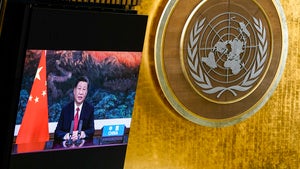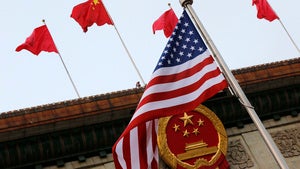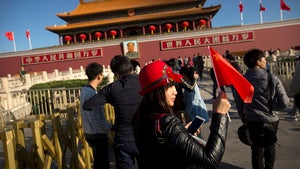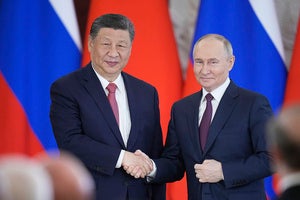Other neighboring countries, including Japan, India, the Philippines, and Vietnam, are viewed less favorably.
New research conducted by the Chicago Council on Global Affairs and The Carter Center offers a rare window into the attitudes of everyday Chinese citizens on international affairs. Fielded between April 25 and June 16, 2025, the survey reveals how ordinary Chinese view their country’s international partnerships. The data show distinctly positive and negative attitudes toward blocs of countries and a sense that the Chinese feel they are surrounded by unfriendly neighbors. But a few countries hold promise as potential intermediaries if needed during current US-China tensions, including US allies Australia and the European Union, and Vietnam, which also has positive relations with the United States.
There are numerous challenges in conducting surveys in China, including designing a representative sample, a closed media environment, and the potential for self-censorship. While treating these results with a degree of skepticism is healthy, previous and repeated surveys conducted by other organizations have found similar patterns among Chinese public opinion on international issues.
Key Findings
- Large majorities of the public in China consider Russia (83%) and North Korea (76%) as their country’s friend. They also view the Taiwanese people (91%)—but much less so the Taiwanese government (44%)—as friendly.
- About half the Chinese public says Australia (51%), the European Union (50%), and Vietnam (47%) are friends to China.
- On the less congenial side, six in 10 Chinese say these Indo-Pacific countries are not friends of China: India (62%), the Philippines (61%), and South Korea (63%).
- Of all the countries presented, the Chinese people consider the least friendly toward their country to be Japan (81% not a friend) and the United States (83% not a friend).
Who Is a Friend to China?
Beijing’s increased profile in global institutions and as an economic and security competitor has translated into greater political clout. Its actions have worldwide effects on climate change, trade, technological developments, and a host of other issues. On the soft power front, Beijing’s Belt and Road Initiative has helped project Chinese influence across the globe, and China’s active participation in international institutions gives it a platform to challenge Western ideas of global governance.
China has diplomatic relations with over 100 countries and partnerships in various regional organizations, including the European Union, the African Union, ASEAN, BRICS, and the Arab League. These relationships vary in organization and description. For example, some are labeled “strategic” or “cooperative,” and others are “comprehensive,” “all weather,” and “permanent.” As the survey data show, the Chinese public clearly sees some countries as friends of China, sees others as clearly not friends of China, and is divided on a number of others.
Friendship with “No Limits”: Large Majority See Russia as China’s Friend
Reflecting a shared opposition to US global dominance, China’s ties with Russia have been growing since Russia’s invasion of Ukraine. In February 2022, just days before the Russian military action, Chinese President Xi Jinping and Russian President Vladimir Putin described their partnership as one with “no limits” and announced plans to increase economic, military, and diplomatic cooperation. China’s trade with Russia has been an economic lifeline that helps Moscow fund the continuing war in Ukraine. Moreover, a 2024 Tsinghua University survey of the Chinese population found that only 6 percent thought Russia is primarily to blame for the Ukraine conflict. Sixteen percent blamed Ukraine, and a third said both Kyiv and Moscow are responsible (36%). Yet a plurality of 42 percent said they believed that “other third parties” are primarily responsible for the Ukraine crisis beyond the two combatants.1
The Chinese public seems to recognize these growing ties. Eight in 10 Chinese (83%) describe Russia as a friend to China, one of the highest ratings of all the countries presented in the survey. A plurality of the public in China believes the basis for Sino-Russian relations is common security interests (44%), an area of growing coordination. Another third selects trade and economic ties (33%) as the basis for bilateral relations, while two in 10 believe common values (22%) underlie this friendship.
Three in Four Consider North Korea a Friend to China
While China and North Korea have longstanding economic and security ties, these relations have often been tense. Chinese leaders have struggled to temper Pyongyang’s nuclear weapons aspirations, and North Korea’s recent defense pact with Russia has given North Korean leader Kim Jong Un another potential source of cash and imports over which China has far less visibility or control.
For their part, a solid majority of Chinese (76%) describe North Korea as a friend to China. They see, by far, a common priority in common security interests (50%)—likely a shared anti-Western orientation—followed by shared values (28%) and trade/economic ties (21%).
About Half Consider Australia, European Union, and Vietnam as Friends
About half the Chinese public says fellow Indo-Pacific nations Australia (51%) and Vietnam (47%) are friends to China. China and Australia have strong economic and trade links, and leaders of the two countries have recently met to discuss increased collaboration in trade, clean energy, and climate change. In 2023, the United States upgraded its ties to Vietnam, which were particularly focused around improving Vietnam’s position in the global semiconductor ecosystem. However, with a new US administration and heavy tariffs levied on Vietnam, Beijing has renewed efforts to bring Vietnam closer.
Half of Chinese also view the European Union as a friend (50%). Yet EU-China relations, once defined by strong and growing trade ties, have weakened since Russia’s invasion of Ukraine in 2022. Ursula von der Leyen, the president of the European Commission, recently described EU-China relations as having reached an “inflection point,” specifically raising China’s ties with Russia in the context of the war in Ukraine, the EU’s large trade deficit with Beijing, and China’s export controls on critical minerals as significant challenges for the EU-China relationship. Despite these recent developments, China remains the largest source of EU imports. And perhaps for that reason, the Chinese public still sees the main basis for Chinese-EU relations as trade and economic ties (58%, 25% common security interests, and 15% shared values).
Not Friends: India, Philippines, South Korea, Japan, and United States
About six in 10 Chinese say these countries are unfriendly toward China: India (62% not a friend), the Philippines (61%), and South Korea (63%). Chinese perceptions of India are likely colored by a history of conflict and border disputes, economic and military competition, and rising power rivalry. Although China and the Philippines share diplomatic and trade relations, the limited percentage of Chinese describing that country as a friend likely relates to long-standing territorial disputes in the South China Sea and the Philippines (including US bases).
Of all the countries presented to the Chinese respondents, they view Japan (81% not a friend) and the United States (83% not a friend) most suspiciously. The legacy of Imperial Japan’s wartime atrocities in China still cast a long shadow over the relationship, and anti-Japan protests have broken out from time to time in response to particular downturns in the relationship. As Genron-NPO/CIPG polls over the past two decades have shown, Chinese and Japanese attitudes toward one another have been generally poor, with a serious deterioration in attitudes particularly evident over the past year.
Current tensions between China and the United States are based on trade, defense, and technological competition. In the past, the United States has also been critical of China’s human rights record. While each of these issues likely feed into the sense that the United States is antagonistic toward China, the tensions over trade likely have the most apparent impact currently: 56 percent of the Chinese public considers trade and economic ties to be the most important basis for US-China relations (27% common security interests, 15% shared values).
The 2024 Tsinghua University survey of the Chinese public highlights a large difference between Chinese perceptions of the US government and the American people. In those results, more than eight in 10 Chinese (82%) express a neutral or favorable attitude toward ordinary Americans, while a similar majority voice somewhat or very unfavorable views toward the US government (81%).
Chinese Differentiate between Taiwanese Government and People
Taiwan is a complicated case. Beijing considers Taiwan a breakaway territory that must be unified with the mainland, by force if necessary. In recent years, Beijing has increased political and military pressure on Taiwan with more extensive military drills around the island, more military patrols across the midline of the Taiwan Strait, and continued pressure on Taiwan’s international partners. Many in the United States defense establishment fear that Beijing is preparing to take the island by force, perhaps as early as 2027.
Despite cross-strait tensions, the survey finds that the Chinese public clearly differentiates between the people of Taiwan and the government of Taiwan. The Taiwanese people, referred to as “Taiwan compatriots” in the survey, are viewed more favorably than any other group, with 91 percent describing them as a friend to China. Only 44 percent consider the “current government of Taiwan” to be a friend to China—though this is notably higher than a number of other nations asked about.
Conclusion
This survey of Chinese public opinion reveals a worldview that is shaped by the current geopolitical winds. On one side, Chinese citizens view ordinary Taiwanese people, Russia, and North Korea with warmth. On the other side, the United States, Japan, South Korea, and other US allies elicit hostility. In the middle, Chinese citizens are split on the European Union, Australia, Vietnam, and the Taiwanese government.
Overall, however, Chinese citizens believe economic and security ties undergird relationships with allies and adversaries, leaving little room for shared ideals and values. As China navigates an increasingly complex geopolitical landscape, this survey offers valuable insight into how ordinary people reconcile national pride with practical considerations in foreign relations.
- 1
This perception is similar to Chinese leadership views that “hostile Western forces” were behind the 1989–student-led protests in Beijing, which were ultimately suppressed by the military.
This analysis is based on data from a poll conducted by NORC from April 25 through June 16, 2025, using a random digit dialing (RDD) CATI telephone methodology among mainland China’s adult population. The final poll includes 1,002 completed surveys with adults aged 18 and over, excluding 52 test cases. The design effect is 1.77 with an overall margin of sampling error of ±4.12 percentage points at the 95 percent confidence level.
The RDD sample frame was created using the national numbering plan provided by the Ministry of Industry and Information Technology (MIIT). The sample included only mobile phone numbers used for residential services and excluded those for commercial services. The sample frame excluded Hong Kong, Macau, and Taiwan.
The sampling frame of active mobile phone numbers was drawn from the four government-owned mobile service networks, which have a total over 1.75 billion subscriptions. The numbers were pre-screened to include working non-business numbers. The sample frame included 91,806 numbers stratified by the proportion of each network. The following mobile service networks were used:
- CBN: 1.83%
- China Mobile: 56.59%
- China Telecom: 22.86%
- China Unicom: 18.72%
There was no within-household sampling and so any adult age 18 or over who picked up the call was eligible to take the survey. There was a maximum of eight attempts to reach an adult for each number.
The field work was conducted by a NORC-trained, phone data collection firm using live interviewers. Interviewers were at least 20 years of age, mostly women. Interviews were conducted in Mandarin, however the field staff included interviewers with sufficient fluency in major Chinese dialects (such as Cantonese or Shanghainese) to conduct interviews with respondents who use a dialect other than Mandarin. Only interviewers who were born in mainland China were hired for the project, to avoid the potential impact of language/dialect on respondent cooperation.











Related Content
 Public Opinion
Public Opinion
Whether Beijing should take any leadership position on the world stage, however, is an overwhelming “yes.”
 Public Opinion
Public Opinion
Few see the United States as a friend to China, but a majority want Beijing to use a mix of cooperation and containment in its approach to Washington.
 Public Opinion
Public Opinion
Everyday Chinese citizens view international trade as good for the economy and job creation, and say China should pursue a policy of global free trade.
 Public Opinion
Public Opinion
New polling from the Chicago Council on Global Affairs and The Carter Center offers a rare window into how Chinese citizens view China's global role and foreign policy.


